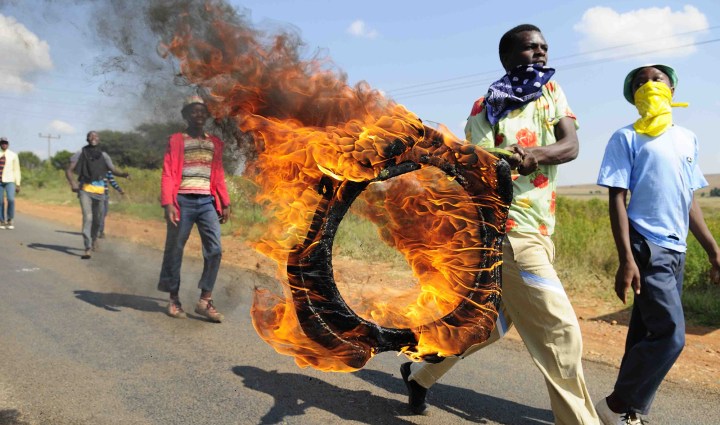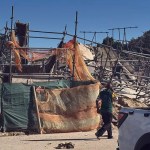ANALYSIS
Divided we fall and fall, and fall again — identity politics offer no solutions to SA’s very real problems

With a general election next year and an unprecedented series of crises being faced by our society, there is little evidence that our politicians are actively looking for solutions to South Africa’s multiple problems.
There is much evidence that our politicians are finding it easier to pick arbitrary fights with each other and within their alternate universe than to spend their time fixing the country’s problems. Coupled with this, the state itself has steadily grown weaker. It appears that those thirsting for political power are more comfortable fighting yesterday’s battles than solving today’s problems.
A decade ago, South Africa was still a land of immense hope. The ANC had just passed the National Development Plan (NDP) by acclamation at its conference in Mangaung. Penned by a team led by Trevor Manuel and Cyril Ramaphosa, it was a publicly available and widely accepted blueprint for our future.
Key to the NDP were its proposals to strengthen the state. These had been agreed to by the governing party and were even welcomed by the main opposition.
Now, 10 years later, our state is probably weaker than it has been at any time since the 1980s.
Crime is rising while the police appear to stand idle, vigilantism is increasing, power cuts hobble our businesses and incomes, unemployment is growing all the time, infrastructure is under attack and cholera stalks the land.
So severe are these crises that ANC Chief Whip Pemmy Majodina felt compelled to spend part of her speech in Parliament on Wednesday arguing against the notion that South Africa is a failed state.
Most of these crises are the result of a failure of governance.
A nuanced picture is important — one always has to consider how much of this near-catastrophic state of affairs was due to the failure of those in charge, and which elements would have been beyond anyone’s reach.
For example, both the 2008 Global Financial Crisis and the Covid-19 pandemic severely weakened the state.
And the deepening process of our democracy may have made it harder to govern at every level.
In the late 1990s, the ANC leaders were sitting so pretty that they did not need to worry about what the party’s provincial leaders thought, with civil society and NGOs going to court on just about every conceivable issue.
Now, disillusioned citizens have grown more assertive, increasingly protesting against the government and making tougher demands by the bucketload. They ask for free housing, free electricity and free higher education. When the government refuses to provide these, people refuse to pay for electricity, they storm campuses and occupy buildings.
But there is also so much the government could have done and failed to do.
Corruption allowed to flourish
For example, government and political leaders have often promised proper economic reform, but have failed to deliver it, despite this being within their power.
As a direct result of this process of weakening, corruption has been allowed to flourish, to the point where it appears this undermining of the state has been deliberate.
It did not have to be this way, as the examples of good governance show.
For example, the Western Cape Department of Health appears to provide better care than the Gauteng Department of Health, famous for hospitals with no water but with a supply of skinny jeans.
Then there’s the municipality of Senqu in the Eastern Cape, which has achieved successive unqualified audits — just one piece of proof that it provides a better life for the people who live there than so many other councils do.
Voters are crying out for a stronger state. They are asking for cleaner water, more reliable electricity, for the police to prevent violence and for the delivery of services.
While these voices are growing stronger, it is one of the features of our current political situation that few of those contesting for power are publicly offering solutions.
Instead of focusing on how the cholera outbreak in Tshwane can be resolved and fixing our water supply systems, the three biggest political parties are arguing about our relationship with Russia.
This is an argument about identity and history, it is all about the elements of the identities of South Africans.
But it does nothing to resolve our major day-to-day problems.
The same is true about the current spat over the proposed new Employment Equity regulations. The DA and others have said they will go to court to challenge them, while the ANC, through the government, says it is merely trying to speed up transformation.
Again, this is an argument about identity, and it does nothing to lead to more economic growth.
There are many other examples of this, where politicians engage in “whataboutism” to label their opponents. It appears that many of our politicians are much more comfortable attacking each other than trying to solve this country’s problems.
Unfortunately, we may now be in a situation where this dynamic is beginning to spiral out of control. As the country’s problems get worse, the politicians focus on what they know best — attacks across the political divide. This then pushes them further into their identity trenches.
And as nothing improves, anger and dissatisfaction will rise among the voters.
At some point, with no solutions being placed on the political table and after years of focus on identity politics, the risk of that anger being the determining political dynamic will be very real — voters will follow the politicians’ lead and turn on each other, rather than looking for solutions.
This of course sets up a feedback loop, where politicians feed on the anger, and offer more of this fare to voters.
The result: more violent populism, where serious solutions are ignored in favour of measures which on the surface appear to benefit one group of people, one constituency, more than another.
It is not easy to see what will break this pattern. As the ANC continues to grow more divided and weaker, and time marches on, it is possible that our awful history will play less of a role in our politics. But it is also very possible that if our economy continues to struggle, our racialised inequality will continue to entrench identity politics to a breaking point. The evidence suggests that our problems will only grow more urgent and almost impossible to solve. DM

















SA’s economic decline, on the back of a corrupt, venal government, has indeed given rise to an increase in identity politics. Our political terrain sees a growing number of spin-off parties from either the ANC or the DA, which often are one issue parties with little to offer. But the opposition from the DA to the proposed new Employment Equity bill is not an example of the rise of identity politics in the DA, but its opposition to it. Grootes is a master at this sleight of hand, always trying to draw some equivalence or ‘fairness’ into his critiques by lumping parties together. The new EE bill is a perfect example of why we are in the mess we are in. The ANC thinks it knows best, can order outcomes by fiat, and does so by almost always ignoring logic or actual reality, including the consequences of its own decisions. No part of our political economy has been spared the negative effects of the ANC’s thinking. In respect of this EE bill, it’s simply incomprehensible to conclude that after 30 years of ANC rule, in a country dominated by its African black majority, governed (badly) by its completely ‘transformed’ political elite, via an almost entirely black cohort of people running the civil service at all levels of government, and across 700 plus state institutions, singling out a tiny minority group or two and effectively excluding them from commercial participation in certain businesses, helps or takes us forward. It’s petty, vengeful, and pure ANC.
Exactly right!
Just let the DA run the country and things will improve.
It’s that simple.
Agreed but ‘there are none so blind as those who will not see’. Currently, who would rather live in Joburg than in Cape Town?
I hate my government but not my fellow South Africans. Does that breach the new Hate Speech legislation?
The new EE bill is pretty much the embodiment of identity politics. It is a little suspicious that the percentages used to determine the correct “ratios” of races seem to impact the only province the ANC doesn’t control. It will be interesting to see how they will determine who is what race, but it is clear that this law serves to give traditional ANC voters more jobs at the expense of all other (not just white) minorities. If you couple that with years of telling their voters that apartheid will come back should they vote for the DA, the constant accusations of racism the moment any critism is directed at them, the threat that the DA would immediately stop all social payments, etc the list goes on, it is the ANC that is primarily practicing the most damaging identity politics by far. Sure, there will be the one or other example that can be found for any political party, after all, it’s catering to your voters and their identity that defines political parties, but implying that there is some kind of equivalency between the ANC and the DA on this topic is just simply wrong.
Just vote DA
There is no more time left for SA
That South Africa is increasingly headed for disaster, is obvious.
How the disaster will look, and when we reach the point of mayhem and anarchy, is anyone’s guess, but get there we will.
It’s simply both heartbreaking and scary.
Perhaps, in order for the DA to be taken more seriously, it needs to write and widely publish it’s own National Development Plan (NDP). We as voters would then be able to clearly identify where the parties differ on policy, and how realistically achievable the DA NDP is. At the moment it seems to me that the DA simply says, Hey, look at the Western Cape, we know how to get things done. But I’m not sure that message is believable if, say, you live in rural KZN or Limpopo.
Excellent idea!
Agree. I think that for every substantive issue, the DA should issue a statement that says if they disagree with government, and how they propose to fix it – effectively saying if you vote for us, this is what you can expect we will do. Provide concrete alternatives on every issue that comes up.
I read something recently that summed up our South African political situation. Paraphrased somewhat it said, “When the institution becomes the subject of worship instead of the ideals and the people who need to be protected and served, real evil creeps in.” What an example of this the ANC is showing us and like all institutional evil it is wrapped up in such pretty words that the gullible are taken in and we are all left helpless and angry at such betrayal.
I wonder when the dam wall will finally break and what the scenes will look like? It seems anarchy is unavoidable. In fact, I suspect this will fit the ANC perfectly since they can then declare martial law and a state of emergency, and we all know how that turned out.
Stephen, in view of the AGs reports on municipalities and latest crime stats, I do not entirely agree with your first paragraph. It seems things are being run ‘for the people’ in the Western Cape, for as far as the national anc government allows. The rest of the politicians really are useless, yes! The anc and eff definitely have no idea how to govern. Commit fraud and corruption while feeding at the taxpayers trough, yes, that they are brilliant at.
It is really unhelpful to frame the Russia issue as only identity politics. The potential economic fallout is massive. Our export trade to the US is 3.5% of GDP. That’s a lot of jobs.
And then it is not impossible that corruption is playing a role. Corruption is not exactly unknown in Russia.
People keep talking about racialised inequality, but what about socio-economic inequality among people of the same race? Go walk through Hyde Park shopping centre on a Saturday morning and see who sits there, decked out very clearly in Gucci and other imported labels. Poor quality sparkling wine promoted by celebrities sell for obscence amounts. Expensive cars are parked in the basement, ready to drive them back to Sandown, where they are protected by armies of armed guards. Why, I often wonder, do these people not concern themselves with their own, starving on the street corner just outside? How can they sit there, slugging champagne, when the streets of Johannesburg have become minefields, no street lights are working, service delivery is an unknown concept. Surely, as the holders of power, they should be working to turn the mess around?